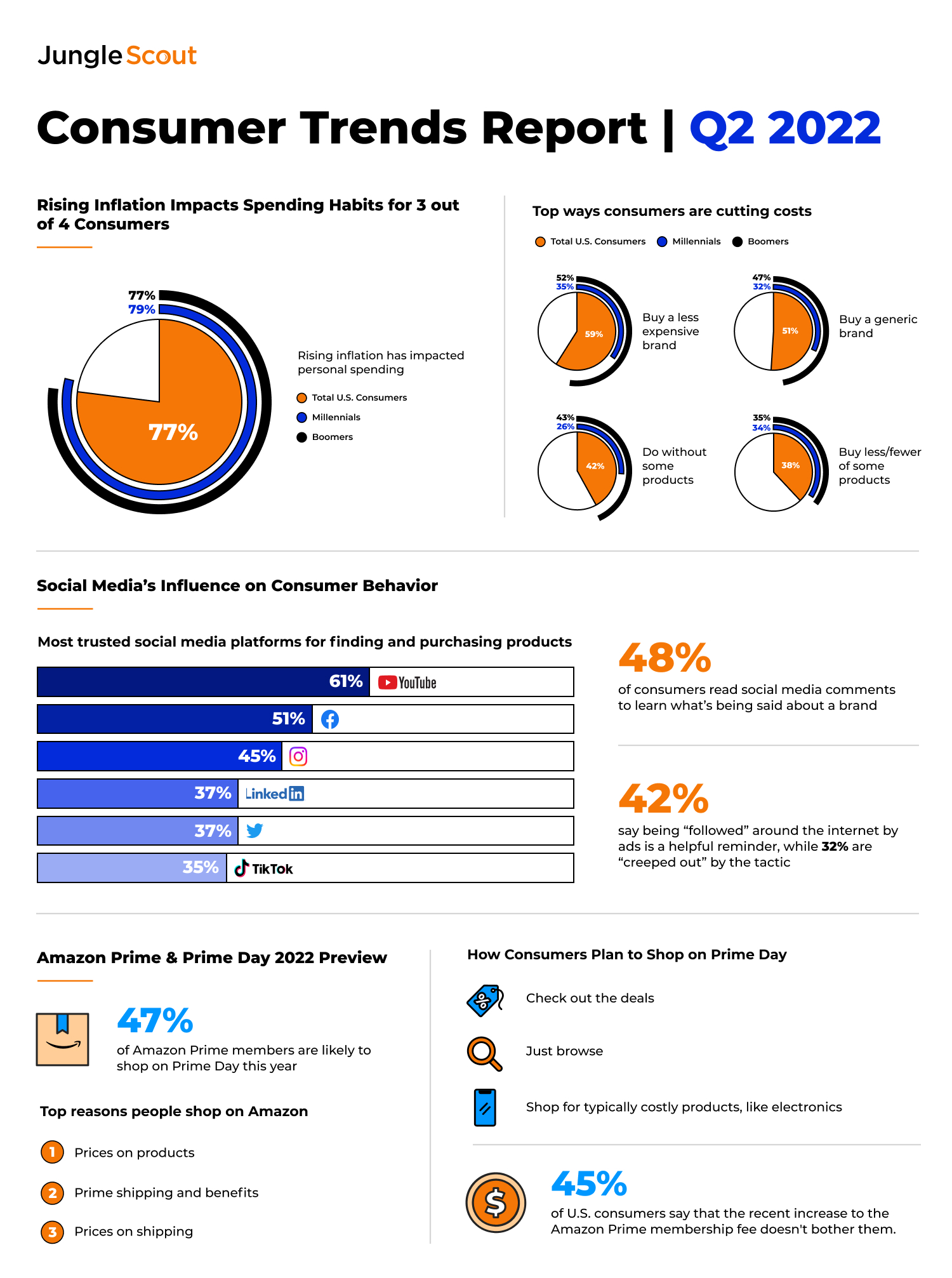How US Citizens Combat Inflation? They Purchase Less Expensive Brands
Inflation, economic slowdown and global recession have a significant impact on spending on online shopping. In a recent Adobe research, it was found global brands earned more than $27 billion in online sales. On the other hand, e-commerce trend watchers stated that phenomenon such as ‘impulse buys’ and ‘zombie shopping’ habits have resulted in curtailed online sales with fewer shoppers opting for large-sized spending. In all this discussion, one silver lining has emerged. The rise of social media and e-commerce. Online interactions and engagement between the brands and consumers has allowed retailers to absorb much of the negative impacts of inflation. More shoppers are opting for cheaper brands, and this has increased overall online sales. In the US, 59% of the consumers are picking less expensive brands during the inflation, which means consumers are still spend-friendly, albeit more cautious when it comes to buying beyond their income and savings. We can clearly say that e-commerce and social media are helping online sellers create a fair play area in their competition with the larger brands.
Inflation and E-commerce Shopping: Why Consumers Prefer to Shop Online?
Online inflation is lower than those measured in the brick and mortar stores.
Consumers are more likely to curb their spending behavior during the inflation by going online. The major reasons include better pricing range, choice of alternatives, loyalty and cash rewards and better customer experience delivered by brand at every touch-point of the shopping journey.
In May 2022, e-commerce technology platform Jungle Scout conducted an anonymous survey of 1,000 US-based consumers. These consumers were asked about their buying preferences and behaviors. Respondents represented 48 U.S. states, all genders, and ages 18 to 75+, as well as varying employment types and income levels.
Recommended AIThority Blog: AI and Big Data Analysis Used to Find Brands’ Emotional Connection
The findings from this survey have been released in Jungle Scout’s Q2 2022 Consumer Trends Report. This e-commerce report is a quarterly study of U.S. consumers that explores spending and e-commerce trends. The report finds that 59% of consumers are buying less expensive brands to cut costs. While inflation continues to impact consumer spending, social media, pricing, and brand loyalty are key factors in shopping behavior.
Key insights from the report include:
Social media and advertising significantly influence consumer purchases and their opinions of brands.
- 35% have purchased a product after watching a social media brand’s live-stream.
- 42% say being “followed” around the internet by ads is a helpful reminder, while 32% say they are “creeped out” by the tactic.
- YouTube is the most trusted social media platform for finding and purchasing products, followed by Facebook and Instagram.
Brand loyalty is at stake as consumers prioritize affordability.
- 48% of consumers are more likely to shop from a brand that has consistently lower prices.
- Consumers’ willingness to switch to a new brand if it is more affordable increased 12% quarter-over-quarter.
Mike Scheschuk, CMO of Jungle Scout said, “Despite concerns about inflation, consumers are still investing in the retail economy and are turning to e-commerce for the best deals. What’s changing is the products consumers buy and the factors that influence their purchase decisions.”
Mike added, “Brands need to reassess their strategy as social media and affordability reshape the retail landscape. By optimizing their online presence, brands can engage with customers, better understand their needs, and secure loyalty in these uncertain economic times.”

Millennials are less likely to sacrifice their shopping habits to cut costs compared to Baby Boomers.
- Baby Boomers are nearly twice as likely as Millennials to go without some products to cut costs.
- Only 35% of Millennials would buy a less expensive brand to save money.
- Baby Boomers are more likely to shop in-store to cut down on shipping costs.
Two of three U.S. consumers shop on Amazon, and most are loyal Prime members.
- 47% of consumers are likely to shop on Prime Day this year.
- Low product pricing is the top reason people choose Amazon.
- Nearly 90% of consumers will likely keep their Prime membership for another year.
- 45% said the new cost of Prime membership doesn’t bother them.
Currently, Austin-based Jungle Scout is the leading all-in-one platform for selling on Amazon. The platform is supporting more than $40 billion in annual Amazon revenue. Founded in 2015 as the first Amazon product research tool, Jungle Scout today features a full suite of best-in-class business management solutions and powerful market intelligence resources to help entrepreneurs and brands manage their e-commerce businesses.
[To share your insights with us, please write to sghosh@martechseries.com]

Comments are closed.